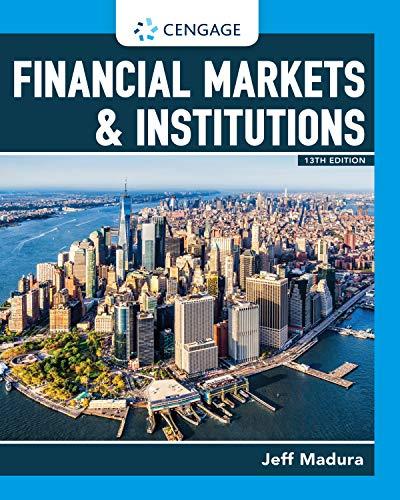Question
Finance 1. You have been saving for a car over the last seven years and you plan to purchase the car at the end of
Finance
1. You have been saving for a car over the last seven years and you plan to
purchase the car at the end of the next three years. Given the following:
a) You have been saving for the last seven years by depositing $500 at the
end of each year into Bank A. You earned 4% annual compounding
during the last seven years at Bank A. How much do you have at the
end of the seventh year?________________
b) At the end of the seventh year, you withdraw your money from Bank A
and deposit it into Bank B where you will earn 5% interest compounded
semiannually for the next three years. How much money will you have
at the end of three years when you withdraw your money from Bank B
to purchase the car?_____________________________
3.
You plan to deposit the following amounts in your savings account at the end of
each 6 month period (semiannually). Your deposit/per semiannual period
are presented in the table below:
6
month
6
month
6
month
6
month
6
month
6
month
6
month
6
month
$500
$750
$1200
$1300
$1250
$425
$675
$350
Assuming you earn 6% semiannual compounding, how much will you have at
the end of four years?_____________________
3.
You plan to deposit the following amounts in your savings account at the end of
each 6 month period (semiannually). Your deposit/per semiannual period
are presented in the table below:
6
month
6
month
6
month
6
month
6
month
6
month
6
month
6
month
$500
$750
$1200
$1300
$1250
$425
$675
$350
Assuming you earn 6% semiannual compounding, how much will you have at
the end of four years?_____________________
4. Assume a person retires today with $1,640,000 in his account. Assume the interest rate is
4.5% compounded monthly. The person plans to withdraw the same amount at the
beginning of each month for the next 20 years until all of the money is gone. How
much will the person withdraw each month? ________________
5. Assume a 6% interest rate compounded quarterly. What is the Present Value of
an investment that promises to pay the following: $1200 received at the
end of
each year
for 30 years?___________________
6. Answer the following:
a) Assume annual compounding. You deposit $18,000 in the bank today. What is
the interest rate that you would earn if you have $25,000 at the end of 10
years?__________________________
b) Assume at the end of year 10, you move this $25,000 to a new investment.
Assume the new investment earns 7% interest rate compounded quarterly. How
much would you have after the six years?__________________________
7.You deposit equal payments of $1000 in the bank for the next 12 years. Assume
the payments are made at the beginning of each year. Assume a 5% interest rate
with quarterly compounding.
a) What is the effective rate of this investment?_________
b) How much will you have at the end of 12 years? ________________
c) Is this an annuity?(yes/no)_______ and if so,
d) What type of annuity?(ordinary/due/not an annuity) ________
8. You deposit equal payments of $475 in the bank for the next eight years. Assume the
payments are made at the end of each year. Assume quarterly compounding. At the end of eight
years, you will have $6,500.
a) What is the effective rate of this investment?______________________
b) What is the nominal rate of this investment?______________________________
c) What is the periodic rate of this investment? __________________________________
Step by Step Solution
There are 3 Steps involved in it
Step: 1

Get Instant Access to Expert-Tailored Solutions
See step-by-step solutions with expert insights and AI powered tools for academic success
Step: 2

Step: 3

Ace Your Homework with AI
Get the answers you need in no time with our AI-driven, step-by-step assistance
Get Started


